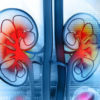Fatty Liver Disease Treatment in New Jersey
 The liver is one of the most important organs in the body. Conditions that affect it can have far-reaching consequences for a person’s well-being. Bergen Medical Associates helps patients throughout northern New Jersey who are struggling with liver illness. Our team of more than 40 board-certified physicians, nurses, and practitioners offers a wide range of specialties and services. Learn more about fatty liver disease treatment and other medical services that help keep patients healthy from your team at Bergen Medical Associates.
The liver is one of the most important organs in the body. Conditions that affect it can have far-reaching consequences for a person’s well-being. Bergen Medical Associates helps patients throughout northern New Jersey who are struggling with liver illness. Our team of more than 40 board-certified physicians, nurses, and practitioners offers a wide range of specialties and services. Learn more about fatty liver disease treatment and other medical services that help keep patients healthy from your team at Bergen Medical Associates.
What Is Fatty Liver Disease?
Fatty liver disease, also called hepatic steatosis, occurs when fat builds up in the liver. Small amounts of liver fat are normal and generally harmless. Severe fat buildup, however, may progress into liver disease. Untreated fatty liver disease can cause permanent scarring (cirrhosis) and may increase the chances of other serious conditions, including liver cancer. This is why it’s important that patients with symptoms of fatty liver disease seek treatment from a gastroenterologist.
The liver is one of the main organs in the body, and for good reason. All blood that leaves the stomach must first pass through the liver, which is responsible for balancing nutrients, filtering toxins, metabolizing drugs, storing iron, and more. The liver has over 500 known functions. All of them are vital to keep the rest of the body functioning and healthy.
What Are the Symptoms of Fatty Liver Disease?
Fatty liver disease is sometimes called a silent illness. This means it can develop without causing symptoms, especially in its early stages. As the disease progresses, symptoms may appear – sometimes over the course of years. These include:
- Fatigue
- Abdominal pain
- Weakness
- Weight loss
- Yellowed skin or eyes
- Spider-like blood vessels under the skin
- Persistent itching
In severe cases, fatty liver disease may cause cirrhosis. This occurs when scar tissue replaces healthy liver tissue, permanently damaging the liver’s ability to function properly. Symptoms of cirrhosis include:
- Nausea
- Loss of appetite
- Internal bleeding
- Swelling in the abdomen, legs, feet, or hands
- Muscle wasting
- Confusion
Symptoms of fatty liver disease and cirrhosis can look like other health problems. People should always see a doctor for a proper diagnosis.
What Causes Fatty Liver Disease?
Researchers and doctors don’t know for sure what causes fatty liver disease. Certain health conditions are linked to a higher risk, however. While having these conditions does not guarantee fatty liver disease, they do interfere with how the liver processes blood and fat, making the disease more likely to develop. These include:
- Being overweight
- High fat or cholesterol levels
- Type 2 diabetes or prediabetes
- High blood pressure
- Hypothyroidism
- Sleep apnea
- Frequent or heavy alcohol use
Fatty liver disease can affect anyone at any age, including children. However, it is most common in middle-aged and older patients.
How Is Fatty Liver Disease Diagnosed?
Because fatty liver disease does not always cause symptoms, it is sometimes difficult to detect. Most cases are diagnosed via routine blood tests or diagnostic tests done for other conditions. If signs of fatty liver disease appear on a test, the doctor may request other tests to confirm a diagnosis. They include:
- Imaging tests: Ultrasound, computed tomography (CT), or magnetic resonance imaging (MRI) scans may show fatty deposits in the liver.
- Blood tests: By measuring the amount of nutrients and toxins found in the blood, physicians can check how well the liver is functioning.
- Liver biopsy: The doctor uses a long needle to remove a small piece of liver tissue, which can be examined under a microscope to look for fat cells.
These tests can indicate the presence of fatty liver disease and help doctors assess its severity. This can help physicians determine the most appropriate treatment plan.
What Treatments Are Available for Fatty Liver?
If fatty liver disease does not cause other health problems, treatment may not be necessary. Some lifestyle and nutrition changes may be advised to reverse buildup or to keep it from increasing. These may include:
- Losing weight
- Exercising frequently
- Adopting a low-cholesterol diet
- Limiting over-the-counter pain medications
- Managing diabetes, if needed
- Not drinking alcohol
Scarring caused by fatty liver disease is not reversible. This is why it’s important to slow fat buildup and control any conditions, such as high blood pressure or diabetes, that might have caused the disease. These measures can stop the disease from progressing, helping patients keep their livers healthy.
Choose Bergen Medical Associates for Fatty Liver Care in New Jersey
Fatty liver disease can cause permanent damage and health consequences. Fortunately, if managed correctly, patients can maintain a healthy liver. Bergen Medical Associates has led northern New Jersey in gastroenterological care for 25 years, with convenient locations across the region. To learn more about fatty liver treatment or to get started, request an appointment today.










